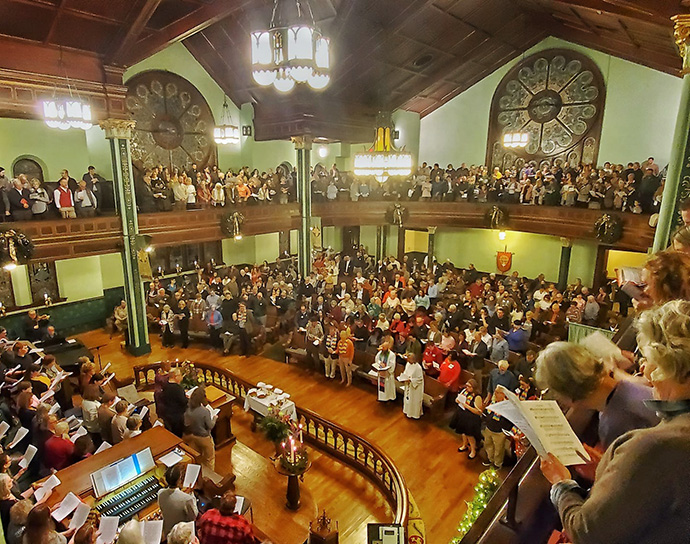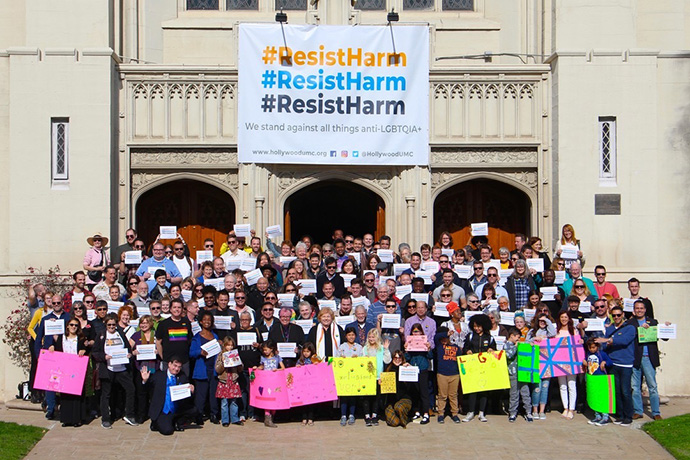
Across the United States, some United Methodist churches kicked off the year with worship services and other events aimed at showing solidarity with LGBTQ Christians.
At First United Methodist Church in Little Rock, Arkansas, some 575 people packed the 120-year-old sanctuary — including the balcony — for a special Holy Communion service Jan. 5 that sought to affirm the image of God in all people.
“The church itself was just filled with God’s spirit,” said the congregation’s senior pastor, the Rev. David Freeman. “Many people have said, ‘This is what the church should look like. This is what worship should feel like.’”
Similar services took place over the weekend at United Methodist churches in Kansas, Nebraska, Oklahoma and California, as well as a Fayetteville, Arkansas, service simultaneous to the Little Rock evening worship.
The gatherings marked the start of Resist Harm Movement, a new organized effort to resist the Traditional Plan that took effect Jan. 1 in the U.S. The new rules, adopted by a 438-384 vote at the special General Conference last year, strengthen longtime bans on “self-avowed practicing” gay clergy and same-sex weddings.
“An impetus of Resist Harm was to offer a counter-narrative to what people heard after General Conference,” said Pat Luna, one of the organizers of the effort and a member of the Alabama-West Florida Conference.
The Traditional Plan faced immediate pushback after the February lawmaking assembly in a number of churches and conferences. However, the Resist Harm effort marks a coordinated opposition campaign.
In a diverse denomination, where enforcement of LGBTQ restrictions varies, Resist Harm organizers expect acts of resistance to take different forms. In addition to ideas for direct action, the effort’s website offers daily prayers, education and worship resources.
“The movement is designed to let everyone do what they can,” Luna said.
By happenstance, the effort was just getting started when the announcement came of a major new proposal for resolving the denomination’s impasse. The plan — the work of a diverse group of traditionalists, progressives and centrists — provides $25 million for traditionalists to form their own church group.
The proposal also requests holding “in abeyance” any complaints under church law related to same-sex weddings or gay ordination until General Conference delegates determine the church’s future at the next assembly May 5-15 in Minneapolis.
Luna called the abeyance a great idea but one that the people behind the proposal have no power to enforce.
“It’s more important than ever for us to continue full-speed ahead with Resist Harm,” she said.
In some cases, she said, that could mean meeting with bishops. Luna was part of a group of about 60 Alabama-West Florida Conference members who met Jan. 6 with the conference’s Bishop David Graves. The group presented a letter imploring him to offer a moratorium on processing complaints. In their meeting, the bishop’s visitors also testified to the harm they see in the current restrictions around LGBTQ ministry.
She said the group acknowledged that Graves is bound by the policies in the denomination’s Book of Discipline, and that many in the Alabama-West Florida Conference support the Traditional Plan. She said Graves was very kind and pastoral with the group.
“It was a very personal time of sharing how we aspire to be more than a traditionalist conference,” Luna said.

First United Methodist Church in downtown Dallas held what the Resist Harm site lists as its first event — a Dec. 29 service for the reaffirmation of wedding vows that was open to both opposite- and same-sex couples.
About 120 couples participated in the service, said the Rev. Andy C. Stoker, the church’s senior minister.
“There were many couples who were appreciative of the collective witness,” he said. “The reception was touching. Clergy from Presbyterian, Baptist, Episcopalian, United Church of Christ and United Methodist churches were in attendance; some offered toasts, blessings and letters of support from their congregation.”
Kathy Webb was the main organizer of the service in Little Rock. The lifelong United Methodist is also the first openly LGBTQ person to hold elected office in Arkansas. She was elected to the state legislature in 2006 and, after she reached the state’s term limit, won a seat on Little Rock’s city board in 2014.
The Little Rock service, she said, drew many LGBTQ people who haven’t been to church in a while.
“One woman told me, with tears in her eyes, it was the first time her gay son had been to church with her in over a year,” she said. “I talked to many who’d been hurt by the church — our church and others.”
The service, she said, offered a sense of belonging.
“I think the message we sent is that there’s a place for everyone in The United Methodist Church — regardless of what the Traditional Plan says,” she said. “And that we will keep working to make it so officially.”
Halfway across the country, the front of Hollywood United Methodist Church in Los Angeles displays a banner declaring the congregation’s commitment to “Resist Harm.”
After worship Jan. 5, those in attendance gathered on the church’s front steps for a photo showing them each holding signs and posters conveying that message.
“About 50% of our membership identifies as LGBTQIA,” said the Rev. Denyse Barnes, the church’s associate pastor who identifies as “queer clergy.”
“So it’s a church that has experienced a lot of harm and also done a lot of healing towards creating a beloved community where all are truly welcome.”
The church’s display also got some welcome attention from the actor Eric McCormack, best known for playing gay character Will in the sitcom “Will & Grace.” McCormack’s wife, Janet, is a member of the congregation, and he occasionally attends.
In a tweet of his wife holding a Resist Harm sign, McCormack wrote: “Not much of a churchgoer, but I applaud & support the leaders & congregation of my wife’s church @HollywoodUMC for standing up for #LGBTQ rights in the face of church discrimination.”
The Hollywood congregation is in the denomination’s Western Jurisdiction, where all five active bishops have promised to provide “a safe harbor” for LGBTQ clergy and same-gender weddings, despite church restrictions.
That’s not the case in other parts of the country.
The Rev. Diane McGehee, pastor of Bering Church in Houston, expects the Traditional Plan to be in force in her conference. Nonetheless, the congregation has found ways to protest the plan that it sees as in line with the Discipline.
Starting Jan. 1, Bering Church decided not to refer to itself as United Methodist in any communication until what it sees as discrimination ends. The church also plans to bless all same-sex couples and families on Jan. 12.
“I think it’s really important that a Methodist clergyperson who is their pastor is willing to affirm their relationships publicly and bless them as we would any married couple,” McGehee said.
Hahn is a multimedia news reporter for United Methodist News. Contact her at (615) 742-5470 or newsdesk@umcom.org. To read more United Methodist news, subscribe to the free Daily or Weekly Digests.
Like what you're reading? Support the ministry of UM News! Your support ensures the latest denominational news, dynamic stories and informative articles will continue to connect our global community. Make a tax-deductible donation at ResourceUMC.org/GiveUMCom.



